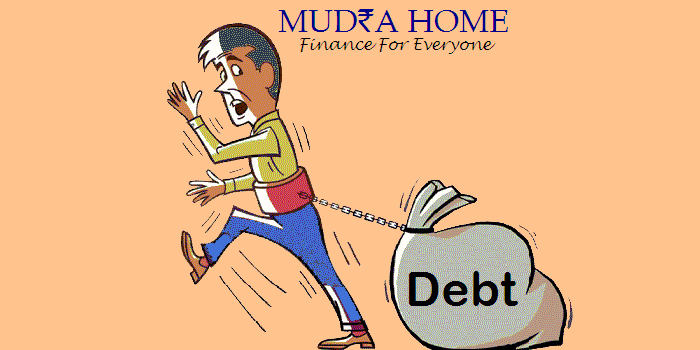
 In simple word, the amount of money borrowed by one person from another is a debt. The most common form of debt is a loan that allows the borrower to borrow the money with certain terms and conditions and repay it on a later date along with some interest. Mortgages, auto loan, personal loan, credit cards are few of the secured and unsecured debts. The borrower has to repay the loan amount within a fixed period of time. The loan amount also constitutes an extra amount known as interest which is to be repaid along with the loan amount. Interest ensures that the borrower compensates the risk taken by the lender and encourages the borrower to repay the loan to save his interest amount.
In simple word, the amount of money borrowed by one person from another is a debt. The most common form of debt is a loan that allows the borrower to borrow the money with certain terms and conditions and repay it on a later date along with some interest. Mortgages, auto loan, personal loan, credit cards are few of the secured and unsecured debts. The borrower has to repay the loan amount within a fixed period of time. The loan amount also constitutes an extra amount known as interest which is to be repaid along with the loan amount. Interest ensures that the borrower compensates the risk taken by the lender and encourages the borrower to repay the loan to save his interest amount.
 A debt trap is a situation when the borrower has a cycle of re-borrowing the loan to afford the scheduled payments on the borrowed amount. Debt trap happens when the borrower is unable to repay the borrowed money and lead to high interest rates. These high interest rates, changes in repayment plans or high penalties on late payments again create difficulties in the repayment of loan amount.
A debt trap is a situation when the borrower has a cycle of re-borrowing the loan to afford the scheduled payments on the borrowed amount. Debt trap happens when the borrower is unable to repay the borrowed money and lead to high interest rates. These high interest rates, changes in repayment plans or high penalties on late payments again create difficulties in the repayment of loan amount.
 When the money is borrowed from a professional lender and the loan agreement include the principal and the interest as two basic elements. The repayment includes repaying both principal and an interest towards the loan amount. Paying the principal amount is more important as it helps he borrower to pay off the loan to full. The amortization structure is applied to many installment loans that clearly show that the loan is designed to be paid in equal monthly installments and each payment applies towards principal as well as interest.
When the money is borrowed from a professional lender and the loan agreement include the principal and the interest as two basic elements. The repayment includes repaying both principal and an interest towards the loan amount. Paying the principal amount is more important as it helps he borrower to pay off the loan to full. The amortization structure is applied to many installment loans that clearly show that the loan is designed to be paid in equal monthly installments and each payment applies towards principal as well as interest.
The debt trap happens when the borrower is unable to pay the principal amount and only afford to pay the amount towards the interest. As paying towards the interest does not lead to any reduction in the principal amount, it is difficult for the borrower to pay off the loan on time. The credit worthiness, type of loan borrowed and the general health of economy are the few factors that decide the rate of interest being charged. The creditworthiness of the borrower is quite an important factor as people with higher credit scores can easily qualify for the better loans and the interest rates whereas people with less credit score have to settle with higher interest rates and unfavorable terms and are at a very high risk of debt traps.
There are several types of loans that can lead to debt traps if not handled properly. The most common of them is Credit card. Due to its revolving balance facility it is a potential debt trap for the card holder. This allows the borrower to use the credit limit to an extent and pay it in small amount over the time. But the balance amount accrues the interest every month. With few credit cards the borrower has to pay a minimum amount every month. Though the minimum amount is very small but this could take many years to pay off and thousand of extra amount as an interest.
Being in high debt not only affects the credit worthiness of the borrower but the other aspects like the savings and investments will also be affected. The borrower has to prepare a budget to meet monthly obligations accordingly and keep the credit score to low. The borrower has to prioritize repayments and take decisions like transferring the balance to lower interest card or to the one that offers repayments through EMI’s.
Debt trap is similar to a hamster on the wheel. The hamster keeps on running and running but staying at the same place. If you find yourself in the similar situation then please feel free to be in touch with the team of Mudra Homes. The experts will not only help you to come out of your debts but also help you to get the credit score and the EMI’s that fit in your budget.
